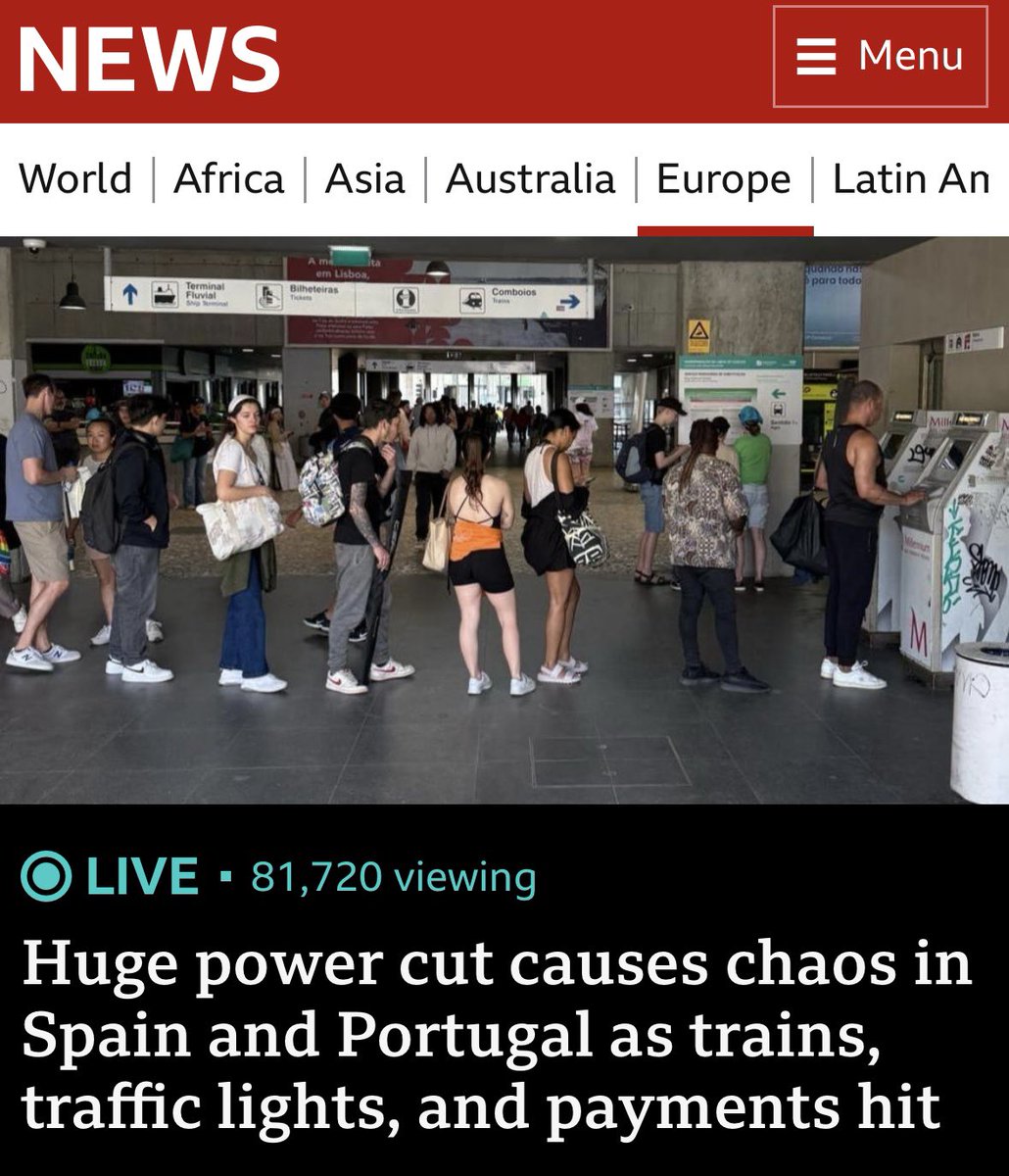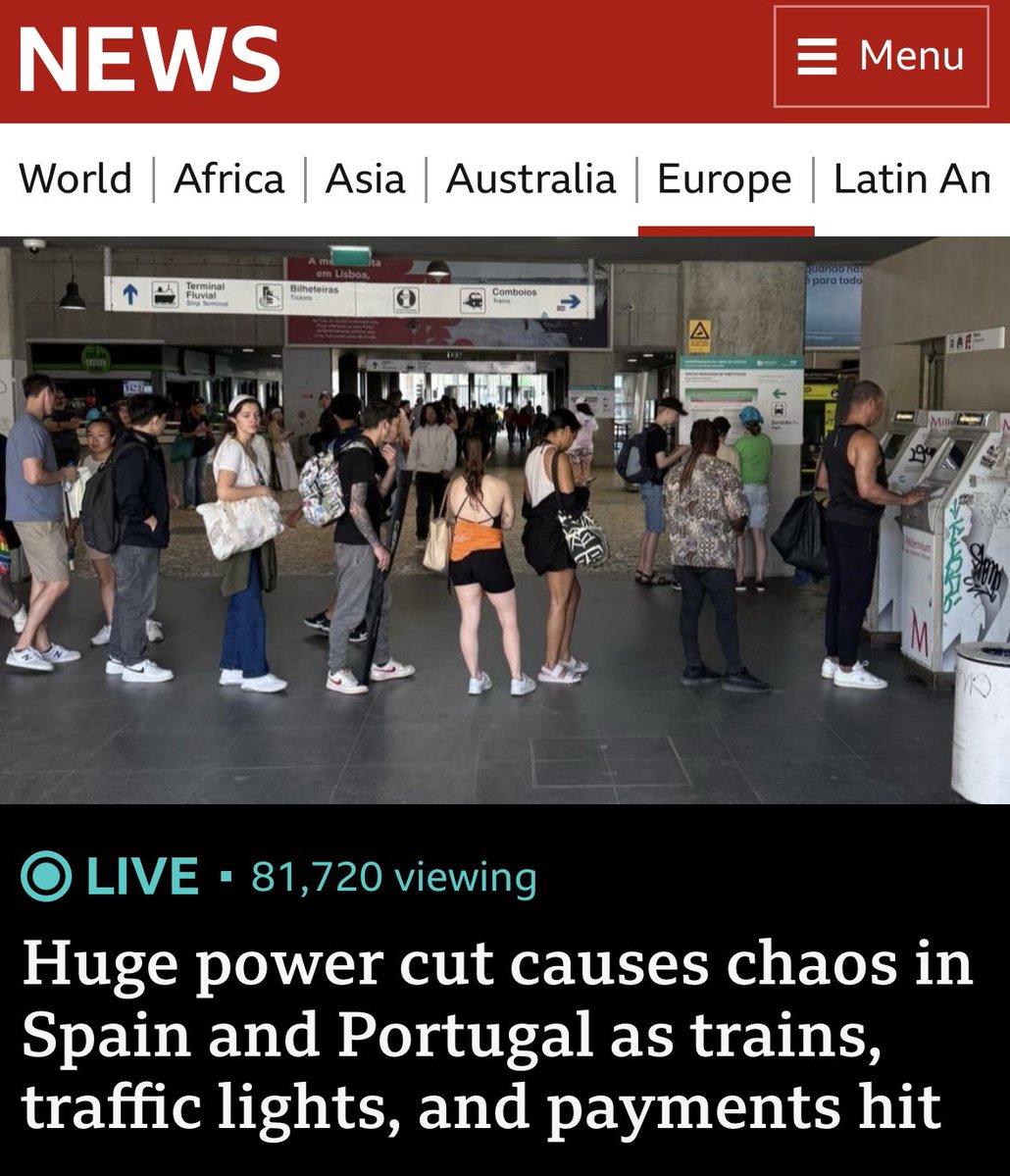Massive Blackout Slams Spain & Portugal: Cash is King Again!
Massive Power Outage Affects Spain and Portugal
On April 28, 2025, a significant power cut struck large regions of Spain and Portugal, resulting in widespread disruptions across various sectors. This incident, shared on Twitter by James Melville, highlights not only the immediate impacts of such an outage but also raises crucial questions about the reliance on electronic payment systems in modern society.
Impact on Daily Life
The power outage had far-reaching effects, particularly in urban centers where public transport systems ground to a halt. Commuters found themselves stranded as trains, buses, and trams ceased operations, leading to chaos in city streets. Traffic lights also failed, contributing to dangerous driving conditions and traffic jams. This widespread disruption serves as a reminder of how dependent modern society is on electricity for everyday activities.
Hospitals faced challenges as backup generators struggled to maintain operations. Critical medical equipment that relies on electricity was compromised, posing risks to patient care. Emergency services were also affected, with reports indicating delays in response times due to the power failure.
Shops and restaurants experienced a significant decline in business as card payment systems went offline. With many establishments unable to process electronic transactions, customers were left scrambling for cash. Long queues formed at ATMs as people sought to withdraw cash, emphasizing the importance of having alternative payment methods available.
- YOU MAY ALSO LIKE TO WATCH THIS TRENDING STORY ON YOUTUBE. Waverly Hills Hospital's Horror Story: The Most Haunted Room 502
The Case for Cash
Melville’s tweet underscores a vital discussion about the future of cash in a digital world. As technology continues to advance, some advocates argue for the phasing out of cash in favor of digital payment systems. However, incidents like this power outage illustrate the potential pitfalls of such a transition. A reliance solely on digital transactions can leave individuals vulnerable during unexpected events.
The ability to use cash provides a safety net during emergencies. When electronic systems fail, cash remains a viable option for transactions, allowing people to continue their daily lives despite disruptions. This event serves as a powerful reminder of the need for a balanced approach to payment methods, ensuring that cash remains a viable option for everyone.
The Broader Implications
The power outage in Spain and Portugal also raises questions about infrastructure resilience. As cities around the world become increasingly interconnected and reliant on technology, the need for robust backup systems becomes clear. Governments and utility companies must prioritize investments in infrastructure to prevent similar occurrences in the future.
Additionally, this event may prompt discussions about the energy grid’s reliability and sustainability. With increasing demands for electricity, especially in urban areas, it is crucial to explore alternative energy sources and improve grid resilience.
As the world continues to embrace renewable energy, ensuring that these systems can withstand disruptions will be vital for maintaining public safety and comfort.
Conclusion
The massive power cut that recently impacted Spain and Portugal serves as a stark reminder of the vulnerabilities inherent in modern society’s reliance on technology. From public transport to healthcare, the effects of such an outage can be profound and far-reaching. Moreover, it highlights the importance of cash as a reliable payment method during emergencies when electronic systems fail.
As discussions surrounding the future of cash and digital payments continue, it is essential to consider the lessons learned from this incident. A balanced approach that embraces both cash and digital transactions may be the best way to ensure that society remains resilient in the face of unexpected challenges.
In the wake of this power outage, it is crucial for governments, businesses, and individuals to reflect on their preparedness for similar events. By prioritizing infrastructure improvements and promoting financial inclusivity, we can better equip ourselves to handle disruptions and maintain the flow of daily life, even in the face of adversity.
Key Takeaways
- Power Outages Can Disrupt Daily Life: The recent outage in Spain and Portugal affected transportation, healthcare, and retail sectors, demonstrating how vulnerable modern society is to electricity disruptions.
- Cash Remains Essential: As electronic payment systems faltered, the necessity for cash became evident, highlighting the importance of maintaining multiple payment options.
- Infrastructure Resilience is Crucial: Investments in robust infrastructure and alternative energy sources are vital to prevent future outages and ensure public safety.
- A Balanced Payment Approach is Necessary: The future of payments should include both digital and cash options to accommodate everyone, especially during emergencies.
By understanding these implications, we can work towards a more resilient future where technology enhances our lives without compromising our ability to respond to unforeseen challenges.

A massive power cut has hit large parts of Spain and Portugal affecting public transport, traffic lights, hospitals, shops and restaurants. Reports of long queues at cash points as card payments are not working – yet another example of why cash must never be phased out. pic.twitter.com/REeu7xHbhR
— James Melville (@JamesMelville) April 28, 2025
A Massive Power Cut Has Hit Large Parts of Spain and Portugal Affecting Public Transport, Traffic Lights, Hospitals, Shops and Restaurants
When a power cut strikes, it can send ripples of chaos through daily life. In late April 2025, a significant power outage affected large areas of Spain and Portugal, leaving many people grappling with the immediate consequences. Imagine waking up to find that traffic lights are down, public transport is stalled, and essential services like hospitals are struggling to operate. It’s a scenario that no one wants to face, but it’s a stark reminder of how dependent we are on electricity for our daily routines.
The impact of this power cut was felt across cities and towns. Public transport systems ground to a halt, leaving commuters stranded and frustrated. Buses and trains that usually run like clockwork became unreliable, causing panic and confusion. Residents were left wondering when they would see their usual transport options return. In many urban areas, the lack of functioning traffic lights led to chaotic intersections, where drivers were left to navigate the roads with little guidance. This situation not only caused delays but also posed serious safety concerns for everyone on the road.
Reports of Long Queues at Cash Points as Card Payments Are Not Working
One of the most striking consequences of the power cut was the failure of card payment systems. As businesses scrambled to adapt, many found themselves unable to process transactions. This led to long queues at cash points as people rushed to withdraw cash, creating a scene that many hadn’t witnessed in years. The irony of this situation was palpable: in a world increasingly moving towards cashless transactions, this power cut served as a glaring reminder of the importance of cash in our daily lives.
With reports flooding in about the inability to make card payments, many people began to realize just how reliant they had become on digital payment methods. The frustration was palpable, with customers unable to buy their groceries, fill their cars with gas, or even enjoy a meal at their favorite restaurant. It was a wake-up call for many, reminding them that cash is still king in certain situations.
This incident sparked a broader conversation about the necessity of maintaining cash as a payment option. As technology evolves, the push to phase out cash payments has gained traction. However, events like this remind us that having cash on hand can be crucial during emergencies.
Why Cash Must Never Be Phased Out
The power cut in Spain and Portugal highlighted a crucial point: cash must never be completely phased out. In moments of crisis, cash can act as a lifeline. It’s accessible, easy to use, and doesn’t rely on power or internet connectivity. For many people, especially those who may not be tech-savvy or who live in rural areas, cash is not just a preference—it’s a necessity.
Consider this: if card payments are down, how will people purchase essential items? What about those who rely on small businesses that might not have the means to invest in backup payment systems? The power cut underscored the vulnerability of digital payment systems, which can fail due to various reasons—power outages, cyberattacks, or technical glitches.
Furthermore, it’s essential to recognize that not everyone has a bank account, and many people rely on cash for their daily transactions. For those living paycheck to paycheck, the inability to access cash can lead to significant stress and hardship.
The Broader Implications of Power Outages
This massive power cut wasn’t just an inconvenience; it raised questions about infrastructure and preparedness. In a world where we are increasingly reliant on technology, how prepared are we for widespread outages? The incident prompted discussions around energy policies, grid reliability, and emergency response plans.
Cities and governments need to prioritize investments in infrastructure that can withstand such events. This includes ensuring that hospitals have backup generators, traffic systems have contingency plans, and public transport can operate in emergencies. Lessons learned from this outage can help shape future policies and improve resilience against similar events.
Additionally, community support emerged as a vital aspect during the outage. Neighbors helped each other navigate the chaos, sharing resources and information. This sense of community is incredibly important, especially in times of crisis. It reminds us of the human connection that can sometimes be overshadowed by our reliance on technology.
What Can We Learn from This Incident?
Reflecting on this massive power cut, it’s clear that there are several key takeaways. First and foremost, we must acknowledge our dependence on electricity for almost every aspect of our lives. Second, the importance of cash in emergencies cannot be overstated. It’s a simple, practical solution that can save people from facing dire situations when technology fails.
Moreover, this incident emphasizes the need for better preparedness. As individuals, we can take steps to be more resilient—keeping some cash on hand, having emergency supplies ready, and staying informed about local infrastructure plans. On a larger scale, governments and organizations should work on enhancing the robustness of power grids and emergency protocols.
Finally, let’s not forget the human element. In moments of crisis, community matters. The support we provide to one another can make a significant difference in how we experience and recover from such events.
In summary, the power cut that struck Spain and Portugal serves as a powerful reminder of our reliance on technology and the importance of cash. It challenges us to rethink our payment systems and infrastructure while fostering a sense of community and resilience. So, the next time you find yourself in line at a cash point, remember: having cash on hand might just be your saving grace.

